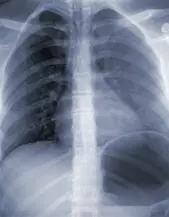- Home
- Patient Care
- Services
- Spine
- Overview
- Current Research & Clinical Trials
Current Research and Clinical Trials
Members of the Washington University Orthopedics spine service are actively involved in both basic and clinical research focusing on spinal conditions. They are internationally respected and have presented more papers at the Scoliosis Research Society (SRS) during the past 10 years than any other center in North America. Active members of the SRS, our physicians also are members of the North American Spine Society and Cervical Spine Research Society.
Among Ongoing Research:

- Assessments of types of surgery for patients with idiopathic and paralytic scoliosis
- Use of intravenous nutrition prior to and after surgery in patients undergoing complex surgeries
- Use of drugs to reduce the amount of blood loss that occurs during operative procedures
- Use of bone morphogenetic protein as a substitute for bone graft, and ways to “program” cells into producing these proteins (*If researchers can reduce the need to harvest rib or iliac bone during an operative procedure for use as bone graft material, surgeons could perform such surgeries less invasively)
- Review of our patients’ radiographic and clinical outcomes to further improve surgical outcomes and treatment of pediatric and adult complex spinal conditions.
Along with research activities, our physicians lead several multi-center study groups in the United States. These study groups enable physicians to enter data about their patients for prospective clinical research that could enhance the understanding of how to treat patients with spinal conditions. Collaborative efforts from these study groups have led to several publications in peer-reviewed journals and have aided in research applications to the National Institutes for Health (NIH).
A Multicenter NIH-Sponsored Prospective Study of Quality of Life in Adult Scoliosis (ASLS):
Dr. Keith Bridwell is the Primary Investigator for a multicenter study funded by the National Institutes of Health (NIH) to evaluate the effectiveness of nonoperative and operative treatments in adults with lumbar scoliosis and to identify important clinical and radiographic factors that may influence outcomes in the management of adults with symptomatic lumbar scoliosis (ASLS).
The purpose of this study: The goal is to determine which treatments are most likely to help patients with symptomatic lumbar scoliosis. The current treatment options available are nonoperative treatment (specifically, intensified physical therapy, medications, spinal injections and observation) and operative treatment (spinal fusion and deformity correction surgery). By tracking treatments received and patient’s self-reported pain, activity and satisfaction, we hope to learn which treatment options are the best for which patients under what circumstances.
Inclusion Criteria:
- Adults ages 40-80 years of age
- Double major or thoracolumbar/lumbar scoliosis with minimum Cobb angle of 30 degrees
- No prior spine fusion surgery in the thoracic or lumbar spine
Study Description: There are two different ways you choose to participate in this study.
You may choose to participate in the study by agreeing to be assigned randomly to either receive operative treatment or nonoperative treatment. Random assignment means information about you is entered into the computer and the computer determines which treatment you will receive. IF the you are assigned operative treatment, surgery is usually scheduled in the next 6 months. IF you are assigned nonoperative treatment, you would start treatments as soon as possible. Nonoperative treatments usually include a combination of treatments (medications, physical therapy, injections, bracing, etc.) designed specifically for the participant. Participants receiving nonoperative treatments can “crossover” to operative treatment if they and their doctor see no improvement.
Although both operative and nonoperative treatments are known to help patients, some participants have STRONG preference for operative or nonoperative care. In that case, you may be able to participate in an Observational study. Treatments, follow-up, and all study requirements are the same, regardless if you are in the Randomized or Observational study.
In this study, ALL patients receive care. There is no “placebo” in this study. There are no experimental therapies, medications or operations being used. All treatments for all participants are considered standard of care. All patients will be monitored closely. We will want to know how you think you are doing, so all participants will complete questionnaires about their health status, spine treatments, pain, activities and satisfaction every three months. All participants will return for clinical examination on an annual basis (though you or your doctor may require more frequent visits). You will be in the study for at least two years. You will be reimbursed for your time. Your contribution, through your participation, will help us understand the best treatment options for adults with lumbar scoliosis.
For additional information, please contact:
More Information:
For information on current clinical trials related to orthopedics, or to make an appointment with a specialist with Washington University Orthopedics, please call (314) 514-3500 or toll free (866) 867-3627.